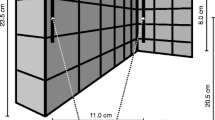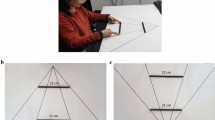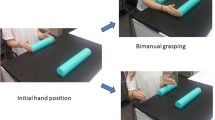Abstract.
Grasping movements are more sensitive to the Müller-Lyer (ML) illusion when the response is made after a brief period of visual occlusion. It is unclear whether this effect is due to (1) the elimination of on-line visual feedback, or (2) reliance on a stored perceptual representation of the target for movement planning. Here participants grasped objects from within two forms of a ML figure in four visual conditions (full vision, open-loop, brief delay, and 2-s delay) and estimated object size in the full-vision condition. Peak grasping aperture was influenced by the ML figure in the full-vision condition, although to a much smaller extent than was true for manual size estimation. The effect of the ML figure on peak grasping aperture was substantially increased in the open-loop and delay conditions, which did not differ from one another. These findings highlight the importance of on-line visual feedback for the resistance of grasping to the ML illusion and also call to attention the relevance of task factors such as target previewing, the visuomotor relevance of illusion-inducing elements, and participant strategies.
Similar content being viewed by others
Author information
Authors and Affiliations
Additional information
Electronic Publication
Rights and permissions
About this article
Cite this article
Westwood, D.A., McEachern, T. & Roy, E.A. Delayed grasping of a Müller-Lyer figure. Exp Brain Res 141, 166–173 (2001). https://doi.org/10.1007/s002210100865
Received:
Accepted:
Issue Date:
DOI: https://doi.org/10.1007/s002210100865




